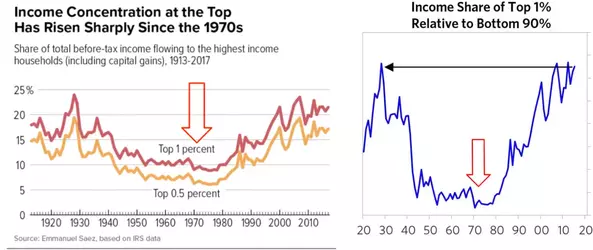The
WTF happened in 1971 website is a good start for this.

Wrong year to focus on IMO. I'd put it on
1978.
1971 was the opening of NASDAQ, which entwined North America and Europe's economies more closely by making trades easier (the shock of which may explain the little bounce, but things were otherwise stable for the decade until near the end of it, when China opened itself (and it's people) to the international market. Corporations basically fled there on mass with their industries to cut costs, leading to mass unemployment across Europe during the ensuing decade. I think the West's attempts to entice
some domestic production to remain behind (or come back) eventually caused further problems down the road. Well,
that, coupled with fiduciary responsibility. It sounds like some Commie gobbledygook to lay a ton of blame at the feet of corporations, but it went both ways (Dodge V Ford 1919 - worst day of my life) and the constant unending pursuit of growth demanded by short-term investors ultimately forces consumers and suffer the brunt of consequences (much like GDP on a nation's citizens).
Corporations slashing costs due to limited growth in an already conquered market leading to them cutting costs in other areas to increase profit. They do this by reducing the actual
food in food with chemicals and other substitutes; reducing overall size of foodstuffs (mostly a Euro issue since regulations mean they can't make up the difference with facsimile); seeking cheaper labour elsewhere or having high turnovers to reduce costs tied to wages; closing workplaces and factories in higher paying areas (anywhere in the West with a decent minimum wage) since the immediate affect on costs reflects good for that quarter which is enough to bump stock value and dip; never paying higher than minimum wage (whether the governments bring in immigrants on their own behest to facilitate this due to the aforementioned
enticements or corporations lobby specifically to achieve this I'm not sure); cutting corners somewhere, somehow, so long as it isn't in breach of the law; etcetera.
Constrained in fewer markets due to geopolitical circumstances (cold war), there was a limited amount of "market share" to go around and everyone had to actually compete and take risks for what little percentage of it they could grasp from under a competitor. This was the status quo for close to 40-50 years. Then it suddenly ended, businesses chased that potential growth as fast as they could straight to the ceiling, but then they still had to keep finding a way to go beyond that because of their
obligations (
you could put triple parenthesis around that if you're inclined but if only I could be so optimistic as to pin it on 1, theoretically easy to fix, thing like that).
The government dependency on corporations for the economy (jobs), coupled with a liberal approach to said economy(free-ish market), meant their hands were figuratively tied in doing anything to stop this and when China opened up to industry the corporations were now in possession of all the leverage.
The reason why "trickle down" never really happened (which I'm just convinced was cope by the politicians who preached it to explain why kowtowing was somehow in a country's best interest) is because it's in contradiction to fiduciary responsibility forced onto the owners of the business/company by law. How does "increasing wage" or "lowering the price" or anything else to that respect help a company achieve its targets? The running of companies was essentially taken out of the hands of the owners and instead given to those who bought into it via shares; people who had no connection or responsibility to the company itself other than to enrich themselves, and demand a company act against the long-term interests of its consumers and workers to do it.
The free market as we envision effectively died before 1920, we were just lucky companies were forced to make do with slow growth thanks to limited market access at the time.







